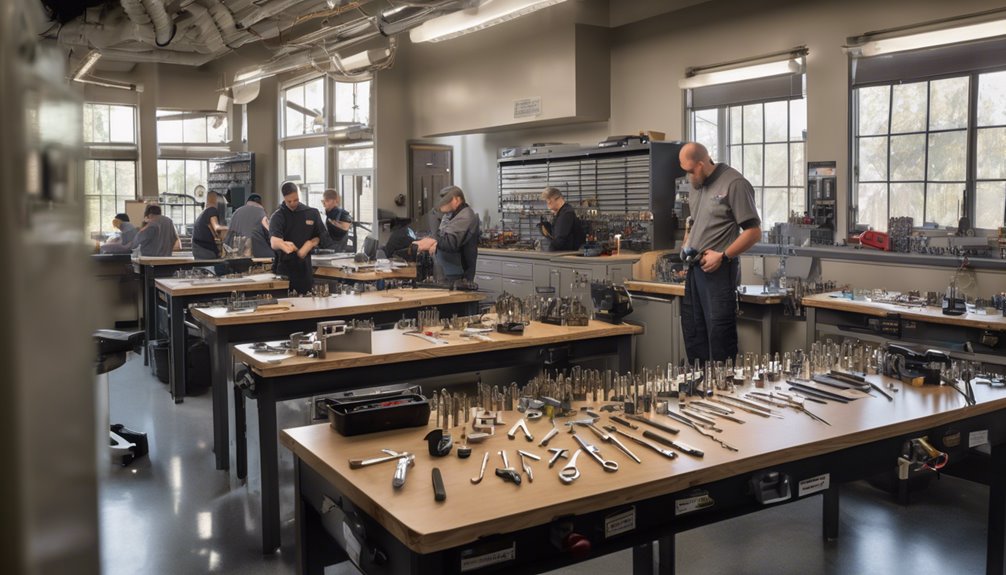If you’re considering a career as a locksmith in Kansas, there are a few essential steps you’ll need to take. First, you should secure your high school diploma or GED, then explore training options that provide hands-on experience. While state licensing isn’t required, local regulations may apply. Curious about the specific requirements and opportunities that could shape your locksmithing journey? Let’s explore what it takes to succeed in this growing field.
Key Takeaways
- Obtain a high school diploma or GED to meet basic educational requirements for locksmith training.
- Enroll in locksmith training programs or seek apprenticeships for hands-on experience in the trade.
- Register with the Associated Locksmiths of America (ALOA) for resources and certification opportunities.
- Check local regulations for business licenses and complete a criminal background check if required.
- Join the Kansas Locksmiths Association (KLA) for networking, ongoing education, and professional growth.
Steps to Become a Locksmith in Kansas

Becoming a locksmith in Kansas requires a few essential steps to set you on the right path.
First, obtain your high school diploma or GED, as this is a fundamental requirement.
Next, explore locksmith training programs that provide hands-on experience and essential skills. You might consider enrolling in courses or seeking an apprenticeship with a certified locksmith to deepen your knowledge.
Explore locksmith training programs for hands-on experience and essential skills, or consider an apprenticeship with a certified locksmith.
Additionally, register with the Associated Locksmiths of America (ALOA) or a similar association for access to valuable resources and networking opportunities.
Finally, be aware of local regulations, including the necessity of a criminal background check, to guarantee you meet all requirements for becoming a Licensed Locksmith in Kansas.
Licensing Requirements for Locksmiths in Kansas
While Kansas doesn’t have a state licensing requirement for locksmiths, you still need to navigate local regulations to operate legally.
Many cities or counties require you to obtain a business license, which is an essential step for your locksmith business. Additionally, you’ll need to undergo a criminal background check, including fingerprinting, to guarantee a clean criminal history before offering your services.
The Kansas Department of Public Security emphasizes high standards for locksmiths, so it’s important to comply with local laws to avoid penalties.
It’s also advisable to register your business name with the Kansas Secretary of State and secure a tax ID number from the IRS.
Operating without the necessary local licenses can lead to severe consequences.
Training Opportunities and Programs Available

If you’re looking to become a locksmith, exploring the various training opportunities available to you is vital. You can choose from in-person locksmith training courses or flexible online locksmith training programs. Local options might be limited, but institutions like Penn Foster offer extensive online training, complete with hands-on practice kits.
Consider enrolling in a locksmith apprenticeship under a certified professional to gain practical experience. Continuous education is also important in this evolving field, and local association chapters can guide you toward relevant courses.
| Training Type | Description |
|---|---|
| In-Person Courses | Hands-on learning with industry experts |
| Online Programs | Flexible learning with practice kits |
| Apprenticeships | Real-world experience under supervision |
| Ongoing Education | Updates on industry trends and techniques |
Types of Certifications for Aspiring Locksmiths
As you commence your journey to becoming a locksmith, understanding the various types of certifications available can greatly enhance your skills and marketability.
One foundational credential is the ALOA Fundamental Locksmith (AFL) certification, which requires completing the Six Day Basic Locksmithing Course.
Beyond that, you can pursue certifications like Certified Registered Locksmith (CRL), Certified Professional Locksmith (CPL), Certified Master Locksmith (CML), Certified Professional Safe Technician (CPS), and Certified Master Safe Technician (CMST).
Each of these requires specific certification exams and demonstrations of proficiency.
The Associated Locksmiths of America (ALOA) provides a structured pathway for your training to become a certified locksmith, boosting your credibility and opening doors to higher earning potential in this competitive field.
Starting Your Locksmith Business in Kansas

Starting your locksmith business in Kansas involves several essential steps to guarantee compliance and success.
First, register your business name with the Kansas Secretary of State and obtain a tax ID number from the IRS. You’ll also need a local business license from your city or county authorities.
Register your business name with the Kansas Secretary of State and obtain a tax ID number from the IRS for compliance.
Don’t forget to secure general liability insurance to protect against potential damages.
It’s vital to comply with Kansas Department of Public Security regulations, which require a criminal history fingerprint check for licensed locksmiths.
Additionally, investing in branding—like signage on your service vehicle and a professional website—can enhance your visibility.
Joining the Kansas Locksmiths Association can provide networking opportunities and resources to help you grow your locksmith services and complete your required training.
Salary Expectations and Job Outlook
When considering a career as a locksmith, you’ll find that the average annual salary in Kansas is around $50,410, but this can vary based on your experience and certifications.
The job market is strong, driven by a rising demand for security services, which means more opportunities for skilled locksmiths like you.
Average Annual Salary
Locksmiths in Kansas can expect an average annual salary of around $50,410, though this figure varies depending on factors like experience and certification.
Here are some key points to reflect upon:
- Entry-level positions may offer lower salaries, while experienced locksmiths can earn considerably more.
- Salaries often depend on local demand, with urban areas generally providing higher pay and job opportunities.
- Continuing education and obtaining locksmith certification can lead to higher-paying roles within the field.
- Your reputation and client base will heavily influence your earning potential as you advance in your career.
Job Market Demand
As the demand for security services continues to rise, you’ll find that the job market for locksmiths in Kansas is thriving. The job outlook for locksmiths is promising, fueled by both residential and commercial needs for enhanced security.
On average, locksmiths earn around $50,410 per year, though this can vary based on experience and certification levels. Entry-level positions may start lower, but with continued education and specialized training in new security technologies, you can considerably boost your earnings.
Staying aware of local demand for locksmith services is vital, as it directly influences your job opportunities. By connecting with industry trends and community needs, you can position yourself for a successful career in locksmithing.
Certification Impact on Earnings
Although many factors affect a locksmith’s salary, certification plays an important role in determining your earning potential. Certifications from recognized organizations like ALOA can greatly boost your income.
Here are a few key points to take into account:
- Entry-level locksmiths typically earn around $50,410 annually, but certification levels can elevate this figure.
- Obtaining certifications like the AFL (ALOA Fundamental Locksmith) can lead to advancements and higher salaries.
- Specialized certifications in security systems often open doors to more complex, higher-paying jobs.
- The job outlook for locksmiths in Kansas remains positive, driven by demand for security services, making continuous education and certifications crucial for long-term success.
Investing in your certification can pay off in both earnings and career opportunities.
The Importance of Networking and Professional Associations
While pursuing a career in locksmithing, you’ll find that networking and joining professional associations can profoundly impact your success.
Becoming a member of locksmith trade associations, like the Kansas Locksmiths Association (KLA), opens doors to valuable networking opportunities with peers. This connection enhances knowledge sharing and keeps you informed about industry trends.
Membership not only validates your skills, fostering credibility among clients, but also provides access to ongoing education programs that keep you updated on the latest security technology.
Membership enhances your credibility and offers vital education on the latest security technology.
Actively participating in local associations can lead to mentorship opportunities, helping you gain insights from experienced professionals.
Ultimately, these connections can lead to job opportunities, partnerships, and collaborations that can remarkably boost your career growth in the locksmith field.
Frequently Asked Questions
Do Locksmiths Make Good Money?
Yes, locksmiths can make good money. On average, you might earn around $50,410 a year, but that can vary based on your experience and certifications.
Starting salaries may be lower, but as you gain experience and specialize in areas like security systems, your earnings can increase markedly.
Factors like local demand, cost of living, and your reputation also play an essential role in determining your income potential in this field.
How Long Does It Take to Learn to Be a Locksmith?
It typically takes a few months to over a year to learn locksmithing, depending on the path you choose.
You might start with a basic six-day course to gain foundational skills, then consider an apprenticeship lasting one to three years for hands-on experience.
If you pursue additional certifications, that could extend your learning timeline.
Do You Need a Permit to Be a Locksmith?
You don’t need a permit to be a locksmith, which is like a wide-open door inviting you in.
However, you must pass a criminal history fingerprint check if you’re providing locksmith services. Local regulations might require you to get a business license, so check your city or county’s rules.
Is It Worth Training to Be a Locksmith?
Yes, it’s definitely worth training to be a locksmith.
With the growing demand for security services, you’ll find promising career prospects and job stability. The average salary is around $50,410 annually, and your earnings can increase with certifications and experience.
Specialized training enhances your skills and credibility, opening doors for growth. Plus, staying updated through continuous education keeps you competitive in the industry, making your investment in training a smart choice.








